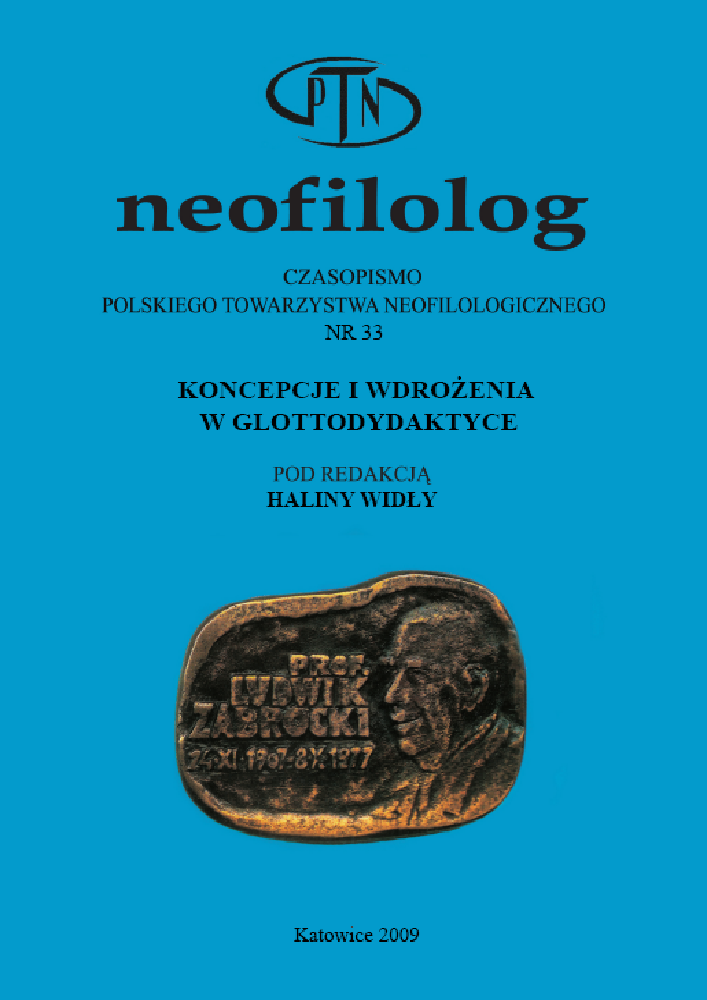Abstract
This paper discusses the importance of working with a literary text (especially poetry) in the context of the foreign language (FL) classroom. In order to facilitate FL teaching, language teachers are encouraged to use poetry and rhetorical devices occurring in such texts (e.g. rhymes, alliteration, metaphor etc.). The paper offers some teaching procedures and techniques based on rhetorical devices, which may prove valuable in raising FL students’ motivation and language awareness while having fun analyzing quality literary texts.
References
Bogdal, K.-M., Korte, H. 2004. Grundzüge der Literaturdidaktik. München: Studienverlag.
Burzyńska, A., Markowski, M. P. 2006a. Teorie literatury XX wieku. Antologia. Kraków: Znak.
Burzyńska, A., Markowski, M. P. 2006b. Teorie literatury XX wieku. Podręcznik. Kraków: Znak.
Bredella, L. 1985. <> (w) Literarische Texte im kommunikativen Fremdsprachenunterricht. (red. M. Heid). München : Kemmler&Hoch. s. 354 – 391.
Bredella, L., Christ, H. 1995. <> (w) Didaktik des Fremdverstehens. Giessener Beiträge zur Fremdsprachendidaktik. (red. L. Bredella i H. Christ). Tübingen: Narr. s. 8 – 20.
Bredella, L., Delanoy, W. 1999. Interkultureller Fremdsprachenunterricht. Giessener Beiträge zur Fremdsprachendidaktik. Tübingen: Narr.
Bredella, L. 2002. Literarisches und interkulturelles Verstehen. Giessener Beiträge zur Fremdsprachendidaktik. Tübingen: Narr.
Fritzsche J. 1998: Zur Didaktik und Methodik des Deutschunterrichts. Band 3: Umgang mit Literatur. Stuttgart: Klett.
Haas G. 2001. Handlungs- und produktionsorientierter Literaturunterricht. Theorie und Praxis eines „anderen“ Literaturunterrichts für die Primar- und Sekundarstufe. Seelze-Velber: Kallmeyersche Verlagsbuchhandlung.
Iser, W. 2006. <> (w) Teorie Literatury XX wieku. Antologia. (red. A. Burzyńska i M. P. Markowski). Kraków: Znak. s. 73 – 93.
Karolak, C. 1999. Dydaktyka literatury wobec potrzeb nauki języka w warunkach obcokulturowych. Poznań: Wydawnictwo Naukowe UAM.
Kast, B. 1984. Literatur im Unterricht DaF. Methodisch-didaktische Vorschläge für den Lehrer. München: Goethe-Institut.
Kozłowski, A. 1991. Literatura piękna w nauczaniu języków obcych. Warszawa : WSiP.
Nissen, R. 2002. >>Textauswahl und Lerngespräch<< (w) Arbeitsfelder der Literaturdidaktik. Bilanz und Perspektiven. Giessener Beiträge zur Literaturdidaktik. (red. M.K. Legutke, A. Richter i S. Ulrich). Tübingen: Narr.
Nussbaum, M. 1998. Cultivating Humanity: A Classical Defense of Reform in Liberal Education. Cambridge : Harvard University Press.
Nünning, A. 1999. >>Es geht immer auch Anders, oder: Unzeitgemäßes Plädoyer für den Nutzen (Und die ‘Praxisrelevanz’!) literaturwissenschaftlicher Theorien, Modelle und Methoden für die Literaturdidaktik und den Literaturunterricht.<< (w) Interkultureller Fremdsprachenunterricht. Giessener Beiträge zur Fremdsprachendidaktik. (red. L. Bredella i W. Delanoy) Tübingen: Narr. s. 65 – 99.
Waldmann, G. 2003. Produktiver Umgang mit Lyrik. Eine systematische Einführung in die Lyrik, ihre produktive Erfahrung und ihr Schreiben. Baltmannsweiler: Schneider Verlag Hohengehren.
Wierlacher, A., Bogner, A. 2003. Handbuch Interkulturelle Germanistik. Stuttgart, Weimar: Verlag J.B. Metzler.
License
Copyright (c) 1970 Dorota Szczęśniak

This work is licensed under a Creative Commons Attribution-NoDerivatives 4.0 International License.
Authors
Authors of texts accepted for publication in Neofilolog are required to complete, sign and return to the Editorial team’s office the Agreement for granting a royalty-free license to works with a commitment to grant a CC sub-license.
Under the agreement, the authors of the texts published in Neofilolog grant Adam Mickiewicz University in Poznań a non-exclusive, royalty-free license and authorize the use of Attribution-NoDerivatives 4.0 International (CC BY-ND 4.0) Creative Commons sub-license.
The authors retain the right to the free disposal of the work.
Users
Interested Internet users are entitled to use works that have been published in Neofilolog since 2017, under the following conditions:
▪ attribution – obligation to provide, together with the distributed work, information about the authorship, title, source (link to the original work, DOI) and the license itself.
▪ no derivatives – the work must be preserved in its original form. Without the author's consent, it is not possible to distribute the modified work in the form of translations, publications, etc.
Copyrights are reserved for all texts published since 2017.
Miscellaneous
Adam Mickiewicz University in Poznań retains the property right as a whole (layout, graphic form, title, cover design, logo etc.).
